 |
 |
| |
|
| |
|
|
| |
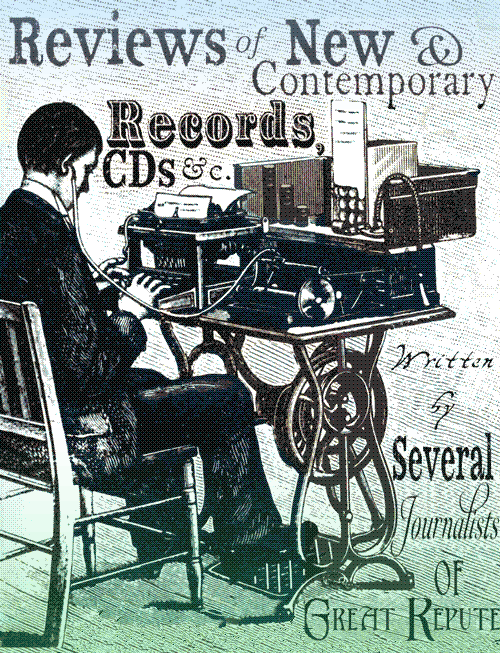 |
|
| = July 2012 = |
|
|
| Spirit Animals |
| Small Faces |
| Minus Pilots |
| Goat |
| Katchmare |
| United Bible Studies |
| Omnia Opera |
| Sendelica |
| |
| |
| |
| |
| |
| |
| |
| |
| |
| |
| |
| |
| |
| |
| |
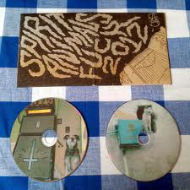
Home |
SPIRIT ANIMALS - FUCK 2012
(Self-Released CD/DVD
- Contact: wwrrssddrrwwss@gmail.com )
Fuck 2012 indeed! If Liverpool-based electronics brutarian Sean Wars, who, for all intents and purposes is "Spirit Animals" wants to do the bell, book and candle routine, and, in some way exorcise this particularly foul year, I certainly wouldn't stand in his way. That's of course if he can actually fit this duty into his pretty involved/busy working schedule; as he's also the prime mover in such projects as Crucifix, Avian Flu, Trouble with Books and Monobrow (not to be confused with the Canadian hard psyche combo of the same name).
Of the handful of pieces before us, there's one constant that bleeds through all levels of mood and texture and that's a rare love of the purging qualities of unforgiving (and at times, unexpected) raw noise that has its roots in Dissecting Table, Macronympha, The Haters and a hefty dose of the Freak Animal roster. On the opener, the punning "Ohm is Where the Heart is", clunky modulation expands to a turbine machine roar which floods the factory floor like so much viscous black oil. "D.I.Y. or G.T.F.O." seemingly approximates the distant rumbles of an underground train system and in "Horrible Hands", the trill of far away pipes and Kalimba-plunk are eventually overwhelmed by blasts of Vomir-like "wall noise". The self same modus operandi services "Buhbye Blood" where the near bronchitic huff of a concertina is viciously shredded by gruelling waves of noxious feedbackery. For me though, the most affecting cut is the extreme vocal splurge of "Bearlesque" in which Robert Ashley's "Wolfman" is trapped in a malfunctioning revolving door for all eternity. I don't think that even being shot by a silver bullet (the ideal method of despatch for lycanthropes...) would make a scratch on this particular incarnation. As for the accompanying dvd, one gets to witness a behind the scenes playthrough and set-up of the entire album. Sean W. is seen pouring over numerous dials, spaghetti'ed wiring and other sundry sound whatsits, and nicely (nicely???) rounds off an arresting and uncompromising slab of cottage industry Brit-noise. (Steve Pescott) |
| |
|

Home |
SMALL FACES –SMALL FACES
SMALL FACES – OGDENS’ NUT GONE FLAKE
(CDs Official Small Faces Re-Masters Series
Immediate/Charly)
To paraphrase the title of the posthumous American version of their Immediate debut, there are [now] but two Small Faces, but both Kenney Jones and Ian McLagen supervised these elaborate multi-disc packages of their two albums for Andrew Loog Oldham’s imprint and contributed anecdotal background to their recording. Several factors ambushed the Immediate debut, which was released exactly 45 years to the day (June 23, 1967) that I’m sat here writing this. For starters, Oldham confusingly self-titled the album again, perhaps leading fans to think it was simply their Decca debut in a fancy new sleeve. But the biggest blow came when a greedy Decca decided to unleash a dumpster-diving collection of odds ‘n’ sods less than a month before. Opening the album with their own version of a track that had just been recorded by the long since forgotten Apostolic Intervention, ‘Tell Me (Have You Ever Seen Me)’ added to the headscratching, but the true fans waded through this labyrinthine hodgepodge of product and rewarded Oldham and his new recruits with a near-Top 10 release.
Surprisingly, Oldham didn’t release any singles from the album, opting for the controversial ode to a speed dealer, ‘Here Come The Nice’ (interestingly, the original name that Marriott wanted for Apostolic Intervention – Oldham saved it for another of his acts you may have heard of!), which may have bolstered sales considerably.
The by now punnily-titled opening track tongue-in-cheekily welcomes the fans back for a decidedly different round of tunes. McLagen’s fluid organ fills on the groovy instro, ‘Happy Boys Happy’ and ‘Something I Want To Tell You’ borrow heavily-yet-reverentially from his hero, Booker T. Jones. ‘Green Circles’ returns to the psychedelic flourishes of ‘...The Nice’ single and features another winning vocal from Lane (and the previously unreleased stereo “phased” version is a revelation), while Marriott’s cockney-inflected introduction on the music hall soft shoe, ‘All Our Yesterdays’ points at the direction the band would explore to greater extent on their next release. ‘Talk To You’ revives their biting R&B roots, the harpsichord-driven ‘Show Me The Way’ is one of their prettiest tracks ever, and Mac’s stoney ‘Up The Wooden Hills To Bedfordhire’ delves deeper into psychedelia.
The set includes both mono and stereo album mixes from the original master tapes, alternate takes, contemporary singles (also in both formats – the extended ending on the stereo version of ‘Here Come The Nice’ adds a bit to that “come down” feeling!), although the mono mix occasionally sounds a little muddy to my ears. [However, I must admit the mono versions of ‘All Our Yesterdays’ and ‘Talk To You’ are much crisper than their stereo counterparts, and Americans may better understand Marriott’s famously off-the-cuff intro on the former.] The singles are arguably the best material on offer, as most album tracks lack the hooks that have made ‘Here Come The Nice’, ‘Itchycoo Park,’ and ‘Tin Soldier’ amongst the bands most memorable songs. [Marriott himself insisted they were never an album-oriented band.] In this respect, the US version (There Are But Four Small Faces), which did include all three singles, may be the preferred version for the casual fan, but this remastered 2xCD digibook set collects everything (and then some) in one place, so you can judge for yourself.
A year later the band had fully absorbed the psychedelic happenings around them, both inside and outside the music business and joined the increasing numbers of bands attempting to fill their expanding heads with a more expansive sound. Concept albums were also de rigueur (Sgt. Pepper, Tommy, S.F. Sorrow, Simon Simopath, The Village Green Preservation Society), so Marriott and the boys combined all of the above into one of the era’s most psychedelically obvious titles (Ogdens’ Nut Gone Flake) and delivered what most consider their finest achievement, split between some of their best rock songs (side 1) and their quirky attempt at a psychedelic fairy tale over on side 2.
Once again, the album opens mysteriously (with the string-laden, phased title track which was merely an instrumental variation of their earlier single, ‘I Got Mine’ – the mono edition and, in particular, the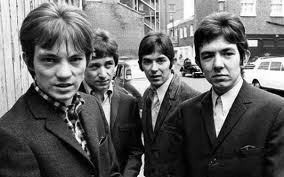 special “phased mix” on the bonus disc capture the swirling effects best) before launching into one of Marriott’s most powerfully emotional vocals in ‘Afterglow’, written about his Immediate label mate and sometime backing vocalist P.P. Arnold. [Still, I prefer the previously unreleased “alternate USA stereo mix” on the third bonus disc, which features a more echoed Marriott vocal and drops the annoyingly silly, mumbled intro .] ‘Long Agos And Worlds Apart’ could’ve been a great song if they bothered to finish it. As it stands, we’ve got a great melody that fizzles out figuratively about halfway through when the lads resort to silly “sho waddy waddy” filler in place of lyrics and then literally fades out and returns for no discernible reason. special “phased mix” on the bonus disc capture the swirling effects best) before launching into one of Marriott’s most powerfully emotional vocals in ‘Afterglow’, written about his Immediate label mate and sometime backing vocalist P.P. Arnold. [Still, I prefer the previously unreleased “alternate USA stereo mix” on the third bonus disc, which features a more echoed Marriott vocal and drops the annoyingly silly, mumbled intro .] ‘Long Agos And Worlds Apart’ could’ve been a great song if they bothered to finish it. As it stands, we’ve got a great melody that fizzles out figuratively about halfway through when the lads resort to silly “sho waddy waddy” filler in place of lyrics and then literally fades out and returns for no discernible reason.
Much of the album’s criticism over the years stems from Marriott’s decision to affect a corny cockney accent on tracks like ‘Rene’, ‘Lazy Sunday’ (otherwise a corkin’ singalong), and ‘Happy Days Toy Town’. Combined with Stanley Unwin’s nonsensical narration throughout the ‘Happiness Stan’ fairy tale which sounds like he’s speaking in Anthony Burgess’ Nadsat language from A Clockwork Orange (original choice, Spike Milligan turned them down), it may best be left to the individual listener’s taste as to whether this supports or ruins an otherwise fine collection of first-rate musicianship, memorable melodies, and exciting experimentation. I’ve listened to him half a dozen times and I still don’t know what he’s on about, so I’d fall on the “can do without” side of the argy-bargy.
So, maybe the ‘Happiness Stan’ adventure is better suited to Donovan’s wistful ruminations, and the constant narrative interruptions ruin the individual songs’ impact, but there’s no denying their adventurous arrangements – the phased vocals in the middle section of ‘Happiness Stan’, for example, could easily have sat amidst The Pretty Things’ tale of S.F. Sorrow. The lyrics to the individual songs also seem to lose the plot (if they ever had anything to do with it in the first place), but the tunes themselves save the day. ‘Rollin’ Over’ is a ferocious rocker and the dreamy ‘Hungry Intruder’ is the equal of anything on Sgt. Pepper for whimsical pop. ‘The Journey’ hints at the progressive movement’s wolfing at psychedelia’s door, and the giddily fun nonsense of ‘Happy Days Toy Town’ is their ‘Mr. Kite’; it also gave credibility to the distinctly British subgenre it formally namechecks (despite specifically excluding Small Faces, there’s a good description here).
Despite the occasional missteps, Marriott’s guitar experimentations reveal an underappreciated talent (check out those hair-raising, proto-metal solos, particularly on the lengthier mono and alternate USA stereo versions of ‘Rene’ – retitled ‘Rene, The Docker’s Delight’ on the latter), and Jones’ drumming ranks with his very best – it’s easy to see why he was the obvious choice to replace Moonie in The Who. The remastered mono mix (on disc 1) is incredibly crisp and punchy – the tunes leap out of the speakers and there’s an entire third disc of 14 previously unearthed goodies, including nearly half a dozen alternate USA stereo mixes, several mono backing tracks and assorted early session mixes. Besides the aforementioned (improved) ‘Afterglow’, highlights include the jaunty instrumental backing track to ‘Happiness Stan’ which bring McLagen’s brilliant organ and harpsichord flourishes to the fore, an early mono mix of ‘Rollin’ Over’ (under the working title of ‘Bun In The Oven), a rough instrumental run through ‘The Hungry Intruder’ (then known as ‘The Fly’, which somewhat explains Unwin’s reference to “the fly” as the main character in the narration to the following tracks on the original release), a sleepier, druggy backing instrumental version of ‘Mad John’ which loses its end narration to the beginning of ‘HappyDaysToyTown’, a funky, piano-driven instrumental, ‘Khamikhazi’, and a powerful, emotional vocal from Marriott on an early version of ‘Every Little Bit Hurts’ that would appear on the posthumous Autumn Stone (and In Memorium in Germany).
Immediate have also gone full-out to make this the most incredible package you’ll purchase all year if you choose to go for the deluxe 3xCD box set: presented in a round box (emulating the limited edition vinyl in the round, 5-panel sleeve) with a round 10-page booklet, a new 24-page essay from Mark Paytress, and six colour coasters. Sorry, but you’ll have to supply the nut gone flake on your own. (Jeff Penczak) |
| |
|
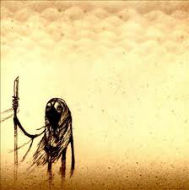
Home |
MINUS PILOTS - HITTING UP THE HEAVENS
(CD from Eat, Sleep, Repeat Records -
www.eatsleeprepeat.com)
Some time back I remember reading a copy of Ian Shirley's biography of the Residents. A strange and brave undertaking for any scribe really, knowing that the Residents were/are(?) that most mysterious of combos, who have lived by a code of complete anonymity for decades. Though inhabiting a smaller planet than those hirelings of the Cryptic Corp., the Pilots seem to embrace the same public non-image approach. No shadows are cast, no personalities are laid out for the public gaze. Their website/cribsheet; hewn from the finest bare minimum, is really centred on the one maxim. Which is that your listening pleasure can be fully secured by using headphones, while gazing at the stars. Um, o.k. Well...everyone loves a mystery!
You see, even an exploded diagram/schematic of M.P.'s components wouldn't amount to a great deal of ink spillage. And yet the omnipresent old vinyl crackle, blurry guitar loops, bass (in)frequencies and malfunctioning tape wobble that grace impressionistic tableaus such as "Into the Void" and "Fall from your Stars" combine to make "Hitting up..." an enigmatic little classic in the field of understated synthetics, which leans towards an Amorfon/Type Records d.n.a.
Now with local light pollution on a scale of 'fair to middling', I'm going to do as the group(?) instruct. That's to get out the 'phones and then just simply focus on the night skies. (Steve Pescott) |
| |
|

Home
|
GOAT – WORLD MUSIC
Limited edition Vinyl/CD from Rocket Recordings www.rocketrecordings.blogspot.co.uk )
With its Heinz 57 varieties of musical reference points, World Music is an aptly titled album debut from this mysterious group, reputedly hailing from a remote part of Sweden but who specialise in – get this- Afro Beat psychedelia of the most wacked out and, in more than one sense, highest order.
So full-on that it borders on the pastiche, World Music blends any number of Kutis with Dr John the Night Tripper’s cod-voodoo sensibility, Santana’s groovy Latin dance vibe, Arabic phrasings and the odd melancholy slice of European folk music. Added to that a female vocalist who occasionally strains to put her stamp on a fuzzed out cacophony of a nursery full of wah-wah and the results are pretty (well not always pretty) insane to say the least.
Kicking off with the rhythmic folk rock of “Diarabi” we are given a tantalising peek of what is to come, but it is on “Goatman”, introduced by an old Creole proverb of, no doubt, some profundity that Goat reveal their true stripes. This is the lead single to be taken from the album and serves as its outrider of the apocalypse with searing guitar, mad bongo bashing and afro chanting. Perfect festival fodder you may well think and you’d have a point, it’s the kind of music guaranteed to banish this evil “summer weather” we’re experiencing and replace it with an electrical storm of an entirely different and altogether more welcome sonic variety. From here there’s barely a let up in the intensity be it the howlingly indignant guitars and lung bursting ranting of “Goathead”, the rather too-obvious charms of “Disco Fever”, the freak out of Golden Dawn” or the more tasteful chug of “Let It Bleed”. However matters reach their zenith with “Run To Your Mama”, probably the most perfect distillation here of Goat’s many, varied and deliciously nefarious influences. “Goatherd” is a more restrained affair, dreamy psychedelic pop of the Mamas and Papas gone bad variety while the reprise of “Dirabai” is like some dream WOMAD paring of COB’s “Shebah’s Return” and Natacha Atlas, with some Piper-era organ chucked in for good measure.
All in all, what “World Music” serves up is an incongruous, infectious and completely unselfconscious feast of tribal acid dance music that defies logical interpretation or easy description. Probably the tastiest psychedelic (dog’s) breakfast you’ll sample this and for many a month. (Ian Fraser) |
| |
|
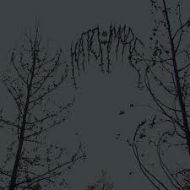
Home |
KATCHMARE – FRIEDA HARRIS
(CDR Heart & Crossbone Records - P.O. Box 29021, Tel Aviv 61290, Israel. www.hcbrecords.com )
Israel's Heart & Crossbone imprint will always have a special place in my heart for clueing me into the oppressive dronescapes and battle drums (in extremis) of Author as Punisher and the earscouring agony that was spitefully dealt out by Lieterspich, which translates from the German as 'Corpse Spunk'. Nice. Well, in a departure for the label, the choke-chain can be stashed away and painful frequencies and a diaphragm-churning bottom end are temporarily shelved in favour of muzzy/amorphous tonalities and coiling tendrils of witchy electronics.
After a number of releases, mostly linked to the 'Scissor Death' collective, American Nick Hoffman (a.k.a. Katchmare), has decided to produce a homage to Frieda Harris (1877-1962), a woman clearly born in the wrong time. With her brightly dyed red har, she cut a figure that was probably just a little too free for those tightly buttoned-down times of late nineteenth century Britain. So...instead of the obligatory needlepoint sessions, she opted for membership of the "Ordo Templi Orientis" (O.T.O.) - much to the harumphing of her Liberal M.P. husband no doubt. Her main claim to fame though, was her otherworldly designs for her 'mentor', Aleister Crowley's "Thoth" tarot deck, which I remember boggling over in some now sadly mislaid occult primer, back in my teens.
And it's pretty evident that shades of that victorian shadow-hugging cult weirdery has transferred itself onto the medium of this particular silver disc. Especially so on "Winterreise", a twenty-five minute crypt level drone exercise that somehow apparently references classical cove Franz Schubert and carries with it a palpable sense of the foreboding and the desolate, with enough ice-crystal tones to chill to the very marrow.. I'm reminded here of Deep Chord/Echospace's "The Coldest Season" and, of my very belated introduction to Thomas Koner's 'white-out' trilogy of albums - "Permafrost", "Nunatak" & "Teimo". "Unseen Chariot" stacks a number of suspenseful pregnant pauses against the sound of a metal insect swarm while the brief "Shifting Snow" and the closing "Ulrikke" dig deep into ritual atmospherics, both having the 'air hanging heavy' touch of mid-period Coil and early times Current 93. But, even though they all pack more than enough substance for the mind's eye to wander, it's a stone cold cert that it's the horrible beauty of "Winterreise" that you'll be inexorably drawn back into. (Steve Pescott) |
| |
|
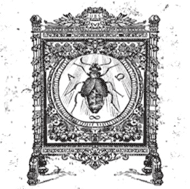
Home |
UNITED BIBLE STUDIES – THE DREAMLIKE STATE OF UNITED BIBLE STUDIES (Tape and Download from http://united-bible-studies.bandcamp.com/album/the-dreamlike-states-of-united-bible-studies )
Terrascope is rightly proud of its many musical associations, and none more so than United Bible Studies, Ireland’s experimental and improvisational folk collective who performed at Terrastock 7 at Louisville, Kentucky back in 2008. We are, then, quite naturally thrilled to learn of their latest release (in tape and download formats, no less – and for that matter, no more) of The Dreamlike States of the United Bible Studies, recorded at various US venues on the tour that took place to tie-in with their Terrastock appearance. That the tour line-up and of this recording should also feature other Terrascopic favourites Sharron Krauss and her accompanist Michael Tanner was never going to detract from our eager anticipation and enjoyment of this quite special live document.
The 16 tracks (which include two versions of Lowlands of Holland, - an unaccompanied Dave Colhoun and Sharron Krauss rendition and a band interpretation) fall broadly into two camps, those of traditional song and those spattered against an improvisational canvas. By traditional I mean of structure and not necessarily offerings courtesy of that greatest of song writing partnerships, Trad/Anon, although there is a fair bit of that as well. Of the accredited songs “Flow My Tears” is a haunting melody courtesy of Elizabethan composer/musician John Dowland, the inspiration for UBS’s 2011 collaboration with Josef Van Wissem (see Terrascope Reviews July 2011) while “Midsummer” features Sharron at her evocative best, accompanied by hand drum and violin. Add to that “The Highland Widow’s Lament” (Robert Burns set to music) and we have evidence a plenty of UBS’s strengths as an off-kilter bunch of folkies, and I’d defy anyone to say there was anything at all amiss with that.
However, as much as I love “traditional song” – and neither version here of Lowlands of Holland are to be sniffed at one bit either – it is the experimental, “let’s see where this takes us” end of the set that elevates this beyond the merely commendable to the more remarkable. It’s pleasing to report that two of these improvisations were at least partly recorded for posterity at Terrastock 7. “The Will’s Awake” is a crackling, spectral incantation which sure sounds as though it was a lot of fun to be performing and I dare say experiencing at the time (lucky old Phil, eh?), while “Offshore” – recorded on the acoustic stage at what to date is the last Terrastock – is a ghost dance as interpreted for the early 21st century, quite eerie and profound. Other numbers performed in the more visceral vein include “Rattling River”, which takes things down a notch or several from the preceding fireworks of “The Will’s Awake”, the ecstatic maelstrom of “If We Are Where We Think We Are”, the unashamedly full-on ranting of “I Will Walk” (the band’s punk moment) and UBS’s great tour epitaph “The Road Giveth...” which ...well imagine Book of Shadows, The Doors and Acid Mothers Temple banding together to lay waste to the Yoko side of “Live Peace Toronto” and you’d be getting warm.
The Dreamlike State, then, is a wonderfully bipolar exposition of all we’ve come to admire and like about UBS. Be warned, it’s rather roughly hewn in places and, as one might imagine from a shifting cast and a propensity towards free-expression, it occasionally swings and misses, but then that all adds to the charm, the thrill even. The “warts and all” will hardly dissuade fans and should not for that matter deter the more adventurously inclined to seek this out via the group’s bandcamp (see the above link) where you are sure to discover that rewards aplenty indeed await the curious. (Ian Fraser) |
| |
|
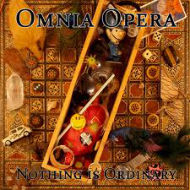
Home
|
OMNIA OPERA - NOTHING IS ORDINARY
( CD from www.omniaopera.co.uk )
Omnia Opera were one of a clutch of bands whose albums were released on the much missed Delerium Records label, run by Freakbeat entrepeneurs, Porcupine Tree-discoverers and all round good guys Richard Allen and his mate Ivor, who from their Gerrard's Cross homeland created one of the enduring legacies of the 'nineties underground, namely the Freakbeat/Delerium axis. Alongside such luminaries as Dead Flowers, Suicidal Flowers, Moom, Nick Riff, Mandragora, Saddar Bazaar and many more, Omnia Opera were at the heart of this psychedelic uprising, lifted on the wings of Ozrics, but fuelled by much, much more. In those days, of course, the word festival meant what it said. Jump to 2006 - a reunion of Omnia Opera. And now to 2012. With Richard Allen railing (successfully) against the injustices of the Channel Islands VAT loophole, festivals sponsored by large corporations, the Ozrics a long since spent force residing somewhere in America, and Stonehenge campfires a distant memory, the stage is set for the return of Omnia Opera in a luxuriously packaged double album.
The epic two hour trip begins with 'Destroyer Of Worlds,' which above thunking drums and speaker-rattling bass both recalls the golden days of old and adds much that is new to the mix. Terrifically recorded and produced, it's already a highlight. 'Second Skin' brings in the vocals, but also a rip-roaring guitar solo and then a concluding 3/4 instrumental section that both rocks and trips. It's the sound of a band in top form. The brief 'Genus Of Angels' sounds a little like those synth inserts Alan Davey did with Hawkwind on the early 'nineties albums, then it's on to the eleven minute monster that is the title track, which opens soft and flutey before going into a kind of half retro, half spacey loper of a cut, all heavily-effected vocals and ethereal synth solos: another album highlight, and again superbly produced. 'Supernova' also comes in around the eleven minute mark, hinting at Hawkwind, but many other festie faves also; Neil Spragg's pounding drums to the fore on this cut, but there's also some tasty gliss guitar too. 'Liquid Underground' opens with tribal drums and some Andy Jones bass harmonics before a chopping, lurching track that features the saxophone of band guest Sarah Jones, and which brings the prog chops of the band to the ear of the listener, as a multitude of time and tempo changes occur. 'Umbilical' is the briefest of ambient inserts, serving as a bridge to the concluding track of disk one, 'Pictures On The News,' telling the tale of our modern times - and, as the album booklet wryly observes, "We would also like to thank the international banking system but look forward greatly to its imminent demise." Too right.
Disk two opens with 'Gateway' - spooky footsteps and eerie sounds - before the listener is launched into 'The Malgi (Illusions Of The Mind)' and its complex guitar/synth interplay, with the latter provided by one Captain Bagley; vocals by Libby Vale. A pounding guitar and synth break cuts up this track, enlivened by acid squelches and sound effects - all very effective, and this is another track that builds, progressively, then deconstructs, also progressively. 'There Is A Field' is another ambient insert (gorgeous sequences), then 'Mr Sludge' heads our way - possibly a gentleman hailing from historical alternative culture. The track is whimsical, I feel, a guess supported by the character of the music. 'Clouds Gather' merges vocal drones and sound effects into a marvellously trippy whole, before the ten minutes opus of 'Big Brother,' which is an ironic sonic attack attaining a kind of punk Hawkwind vibe circa 'Quark Strangeness And Charm,' not least in that string synth sound. And while the cut does borrow from that album and that era, it wears its influences lightly, and isn't a slave to them - another album highlight for sure. 'Corridor Of Crows' is a third delightful ambient insert, then it's 'Under The Sun,' which brings Libby Vale to the fore and again highlights the band's social conscience, not least everything Uncle Sam has brought to the world. A final ambient linking section plays out, before the album's final cut, 'Leaning Backwards,' which is soft, light and airy, nicely judged, beautifully played and recorded, and the perfect ending.
This album requires much of its listener - two hours of music, complex imagery, progressive leanings, spaced out sections, with nods to many of the greats of the space/psych/underground heartland, although this is a band well grounded in their own style who have the ability to borrow from, say, Hawkwind, without being a slave to that sound and that world. I suspect "Nothing Is Ordinary" will with hindsight be viewed as a considerable achievement. Good to have them back. (Stephen Palmer) |
| |
|
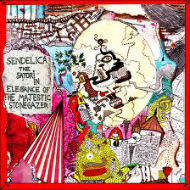
Home
|
SENDELICA - THE SATORI IN ELEGANCE OF THE MAJESTIC STONEGAZER
(CD from http://sendelica.soundawesome.com/ )
"Welsh wizards of psychedelia," "dubby, trippy rock" and "a never less than bonkers brew" are all phrases I've used to describe psych-rockers Sendelica, who on their new album create... well, a trippy brew of bonkers psychedelic rock. But we wouldn't expect anything less from them. Formed six years ago in the hinterland of the greatest country on Earth, Sendelica merge Ozrics jamming, Hawkwind groove and lengthy guitar solos to make the kind of all-out cosmic rock attack that's fantastic live, but which is pretty damn good on CD also.
The new album opens with a guitar and synthi-bubble freakout entitled 'Magical Ninin,' wherein the basic fourpiece head off into Brocky wig-out landscapes, led by the rotationally moving lead guitar of Pete Bingham, who, with bassist Glenda Pecado, founded the band. But there are guest artists a-plenty on this new release, not least Virginia Tate's flute on chill-out cut 'Aetheraland,' accompanied also by the drifting synths of Roger Morgan, creating a groovy late evening jam - very nice indeed. The next four tracks are entitled 'Satori In Elegance' and over thirty minutes cover ethnic, Ozric, eldritch and zen-witch territory, opening with the always trippy part one, in which Pete Bingham's harmonised guitars work really well against the mysterious oriental saxophone musings of Lee Relfe (a regular band guest). The structured approach of the track works nicely after the improv nature of the opening cut and the delicate second piece. Part two goes into Sabbath jam lands, with the soloing guitar once more at the fore. Part three covers half of this multi-phase piece, opening with nicely produced electronics and dub effects, before a jazzy track begins to emerge, with much softly delayed guitar and pattering, effects-heavy drums from Paul Fields. Slowly the mood of the track changes as the pace picks up, and another jam session styled piece emerges, this one placing a little more emphasis on the synths. Part four concludes the Satori theme with birdsong and just-before-dawn gentleness. A delightful ending.
The concluding pair of cuts, 'Preseli Daze' and 'The Majestic Stonegazer' return the band to full-on, fuzzed out jam mode, with Lee Relfe once more providing a sax break. As with last year's release, the album comes with a DVD bonus, featuring 'Journey To The Centre Of The Mind,' wherein various hippy archetypes (grizzled old man, acid freak, red haired one, bearded one) discuss the nature of the mind, before the band kick in and the multi-coloured, heavily video-effected trippy visuals come along. 'When The Rising Apes Meet The Fallen Angels' does similarly, except with stone circles.
For space-rockers, Hawk freaks and hardened Brit festie-goers this will be one of the essential releases of the year. Maen nhw'n gweithredu'n groes i bolisiau'r llywodraeth! (Stephen Palmer) |
| |
|
|
|
| |
|
|
|
| |
|
| |
|
| |
|
| |
|
| |
|
|
 |
|

